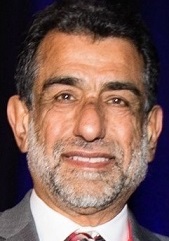Woolpert Vice President and Chief Scientist Qassim Abdullah has been named to the Transportation Research Board’s (TRB) inaugural Standing Committee on New Users of Shared Airspace. The committee focuses on how emerging and growing aviation applications—including commercial space operations, unmanned aircraft systems (UAS) and urban air mobility (UAM)—can participate safely in an already occupied airspace. The committee addresses how the aviation ecosystem can support these aerospace operations in harmony with the operations of established users.

Abdullah is a member of the Unmanned Aircraft Systems Standardization Collaborative, which is developing standards to facilitate the safe integration of drones into the U.S. National Airspace System. He also is a member of the TRB Standing Committee on Geospatial Data Acquisition Technologies and was the creator and principal author of the new ASPRS Positional Accuracy Standards for Digital Geospatial Data Standards.
Woolpert Aviation Market Director Chris Snyder added that this is an outstanding opportunity for Woolpert and for the architecture, engineering and geospatial (AEG) community as a whole.
“Dr. Abdullah’s appointment gives us a voice in the development of ideas, standards and proposed legislation on issues concerning the national airspace—especially where the integration of innovative aviation applications is concerned,” Snyder said. “The work of the TRB is essential to our industry, and our involvement in these committees enables us to better support our transportation and aviation clients.”
Woolpert is a recognized leader in UAS aviation, research and application development. Woolpert is the lone AEG company with a representative on this committee, whose two dozen members include individuals from the Federal Aviation Administration, state departments of transportation and universities across the country. The committee is led by the faculty of Embry-Riddle Aeronautical University, which is a leading powerhouse in aerospace and aeronautical education.
The TRB is a unit of the National Academies of Sciences, Engineering and Medicine. It provides independent, objective analysis and advice to the nation and conducts other activities to solve complex problems and inform public policy decisions.






-and-William-Lee-of-SF-Airlines-_-_127500_-_bf81080d3f4124c3d4f40d73b84e5488e09a4379_lqip.png)


